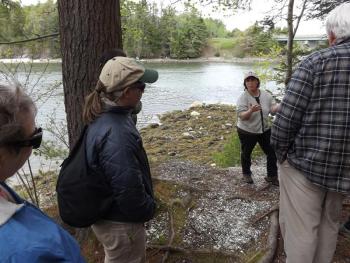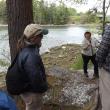Volunteers needed to help document sea level impact on shell middens
Maine’s rich cultural history spans thousands of years. The first coastal residents were the indigenous hunters and gatherers who relied on the natural resources of the region’s forests, marshes, and coastline. Many cultural artifacts of these people are preserved in the region’s shell middens – accumulations of shells, bones, and artifacts – and these middens are critical to understanding the history of the people who lived here before us.
Unfortunately, shell middens are disappearing as a result of a number of factors. As sea levels rise, the water reaches higher and higher, gradually washing away coastal bluffs and middens. Cycles of freezing and thawing in the colder months break apart the midden surfaces. Collectors who dig into the middens looking for artifacts contribute to erosion, as do visitors who walk on the middens.
The first step in protecting this cultural and historical resource is to document how changes are occurring over time. That is the goal of Maine Midden Minders, a new initiative working with a network of individuals and conservation groups, including Coastal Rivers Conservation Trust, to develop a database of erosion conditions at middens around the state.
Coastal Rivers is seeking volunteer Midden Minders to make regular visits to one or more of Coastal Rivers’ many middens to take measurements and record changes through observations and photographs. Volunteers will also document storm impacts, which will help researchers and resource managers understand threats to the middens and plan for data rescue and conservation. Volunteers will need to commit to visiting their midden or middens at least twice a month during the warmer months.
The first annual Midden Minders volunteer training will be offered Tuesday, June 18 from 3 to 7 p.m. at Coastal Rivers’ Education Center at 110 Belvedere Road, Damariscotta. Participants should be prepared to walk in the field and practice monitoring methods. Proper attire should include hiking boots and tick protection. A pizza dinner will be provided. There is no cost for the training. Online registration is required at coastalrivers.org/events.
Individuals who are interested in becoming Midden Minder volunteers but cannot attend the training are invited to contact Sarah Gladu, Coastal Rivers’ Director of Education and Environmental Monitoring, at sgladu@coastalrivers.org.
Based at the University of Maine and funded by Maine Sea Grant, Midden Minders is managed by geoarchaeologist Dr. Alice Kelly, who initiated the program. Kelly is an instructor at the University of Maine School of Earth and Climate Sciences and a Research Associate Professor with the Climate Change Institute. Coastal Rivers has been a local leader in establishing this effort.
For more information about Coastal Rivers, call (207) 563-1393, email info@coastalrivers.org, or visit www.coastalrivers.org
Event Date
Address
United States
























